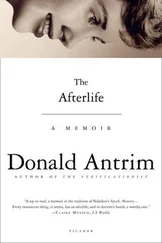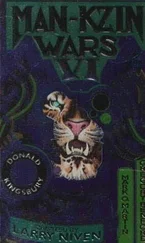“Wait a minute. Roaches live in the oven?”
“Yes.”
“Don’t they get cooked?”
“Of course they do. They’re in there baking right now. But there are so many roaches in that oven. New ones keep moving in, and the burnt ones fall in the food.”
“I’m sorry to hear that.” I held Rebecca’s hand tightly. I could not tell whether Bernhardt had been eavesdropping on our conversation. He continued to breathe against my neck. Rebecca said, “You seem like a nice man. There’s no reason for you to eat bugs.”
“Thank you.”
“I mean it,” she said; and I could tell, from the way she nuzzled against me, her body in its gingham dress curving softly at the hips as she bobbed up and down in the air, I could tell that she did.
Then Rebecca looked down and her eyes got wide. Her body tensed — I could feel this through her hand in mine — and her face got that expression people’s faces get when something alarming comes into consciousness. Her tongue came out, once, then again; and her mouth stayed open, and she cried, “Oh, my God, we’re so high! I don’t like it up here! Will you put me down? People are staring at us. I want to get down!”
“Don’t look at the ground.”
“I’m dizzy.”
“Look up.”
“I’m scared.”
“Close your eyes and breathe deeply,” I said; and I could see, looking from table to table around the restaurant, that Rebecca was right: we were closely watched.
“I’m going to pass out! I’m passing out!” she cried. I squeezed her hand and shouted at her, “Pull yourself together! You’re going to make me drop you! You’ll make me drop you and Richard will drop me, and then where will any of us be?”
It was a question worth considering. It was unlikely that Rebecca or I, if released and dropped — Rebecca falling away from me, I tumbling from Bernhardt’s arms — would suffer much in the way of honest-to-God physical hurt. We were not in fact terribly far off the floor. At the same time — and here is an important point, I think — we were quite high off the floor. We held one another, we were bound together in dependency; and our flying, this sensation of rising and hovering, was more than an imaginary event, neither dream nor fantasy. It was a complex and convincing ordeal that we created and shared and believed in — Rebecca and Richard and I, along with the analysts watching from their tables — together. You might say that our flying was the sensory and perceptual equivalent of a so-called psychosomatic illness. It is incorrect to say that the psychosomatically ill person fantasizes symptoms. Symptoms and illnesses manifesting psychosomatically — as the physiological “consequences” of obscure or extreme emotional turmoil — are no less real, no less medically verifiable, than, say, a cold or the flu caused by routine viral or bacterial contagion and infection. The true hypochondriac inhabits his condition, feels every ache and every fever. Rebecca and I, held up by Bernhardt, felt every dip and rise, every swift descent over the heads of our sitting and walking friends. Falling from the sky would be a shattering, bitter end to the affair.
“Don’t let go of us,” I pleaded to the man holding me. By then I think I realized that he had no intention of releasing me, that there was, for Richard as well as for me, something significant — something movingly, vividly pornographic — taking place.
“I love you, Tom,” he whispered; and his arms in red sleeves closed tightly around me, reaching around my arms and across the lower part of my chest; and also his hands, Richard’s open, enormous hands, reached down from my chest to cover the soft area over my stomach, and I felt Richard’s fingers extending around either side of me, pressing into my ribs.
I could feel, more and more as the night went on, the overwhelming weight of him, Richard’s whole body pushing against me and squashing me. I was feeling sore all over from the heaviness of Bernhardt crushing me, and it was hard to get air.
“Close your eyes,” I said to Rebecca, who thrashed and struggled like a person drowning.
“I’m going to be sick!” cried the girl.
“You’ll be all right,” I assured her, in spite of the fact that I was feeling queasy myself — as I had been all night since taking off, propelled by Bernhardt on my own flight. Rebecca’s hand in mine felt cold and wet with her sweat. We were both sweating. There was moisture on her face and her arms. I was afraid her hand would slip out of mine.
“Going to be sick,” she said again. Her voice trembled and her long hair fell forward across her face, sticking there. Her face was sallow white. She was clearly wretched. I pulled on her hand and swung her a little distance through the air, bringing her close to a Dutch oven hanging from a thin metal wire attached to the ceiling.
“Throw up into the pot,” I told her, and she leaned her head into the Dutch oven and vomited.
“Good girl, that’s a good girl,” I said while Rebecca heaved and spat. I was trying to calm her. It is embarrassing to throw up in public, and no one who does this wants to feel reprimanded.
Her head hung halfway inside the pot, and her hair draped around its rim, encircling the black outside of the Dutch oven. She reached up with her free hand, gathered the hair into a ponytail, and held it away from the iron cauldron and her neck. Her neck above the blue dress was bare. Rebecca held her hair in her hand, and I saw, on the back of her neck, across the spine and beneath her hairline, the tiny, recognizable pattern of freckles and moles.
It was a detail from Jan Brueghel the Elder’s A Woodland Road with Travelers, one of Brueghel’s small and intimate, perspectival paintings of Dutch peasants in a landscape. A Woodland Road with Travelers shows men and women with their children on a journey, carrying burdens and leading hobbled and swaybacked draft animals that draw broken-down carts piled and overspilling with household belongings and more people, the cart’s drivers and, presumably, the very old who cannot walk over the stones and brambles and fallen leaves and the tree roots that stick out everywhere from the forest floor — a caravan of the poor making their way inexorably along a road that never was a road, underneath old trees that bend down over the heads of the people, blotting out the sun. Deep blue sky, three or four dark birds, the forest’s edge, and one or two painted clouds are apparent in the immediate distance. In the lower left foreground, beneath a tree, lies the bleached, intact skeleton of a fallen horse. The animal’s skull is huge and, as is true of everything in Brueghel’s work, observantly painted. Two finely dressed men — aristocrats? royal messengers? prosperous thieves? — ride on horses past the skeleton, through the trees and into the woods. Do they notice the bones of the fallen animal? Is a dead horse cause for concern? Where are the men going? What danger are they riding toward? The pilgrims with their overloaded carts, on the other hand, mainly travel away from the viewer; and there is a feeling that these good people have left their homes and whatever blood ties exist for them. They plod with their loads toward the break in the forest, toward a town or village with its church steeple faintly discernible, rising up at the vanishing point on the horizon. A few travelers, and a small black, brown, and white dog have stopped to sit and rest beneath the trees in the lower right corner of the scene. The dog peers back along the road, back into the dark woods toward unseen things that have been abandoned or lost in the recent past; and the dog gazes, as well, into the eye of the viewer standing before the painting. Caravans proceed toward and away from the town. The wealthy horsemen ride heedlessly into the forest. The mood of the painting is neither happy nor sad, frightening nor liberating; it is all these things.
Читать дальше












